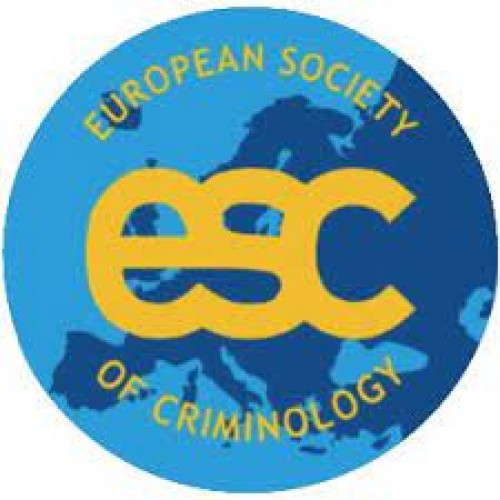Secretariat report, 2024
In brief
The 24th Annual European Society of Criminology (ESC) meeting, held in Bucharest, Romania, in September 2024, marked a year of consolidation and continued innovation for the society.
Key highlights include:
- Membership adjustment: ESC membership settled at 1,560 members, a 28% decrease from the 2023 record high of 2,175, representing a natural readjustment while maintaining levels well above pre-pandemic figures.
- Sustained global representation: Members from 58 countries across the five inhabited continents, with European countries accounting for 84% of membership and strong international participation demonstrating the ESC's continued global appeal.
- Strong student engagement: Student members increased to 26% of total membership (399 members), reflecting robust engagement from emerging criminologists.
- Successful conference: Eurocrim 2024 in Bucharest attracted 1,577 participants, maintaining strong international attendance and providing valuable opportunities for academic exchange in Eastern Europe.
- Excellence recognition: Five awards were presented, including the ESC European Criminology Award to Per-Olof Wikström for his groundbreaking work on Situational Action Theory.
- Educational initiative: The first ESC Summer School took place in Lausanne in September 2024, establishing a new platform for enhancing the education of emerging scholars and strengthening the scientific community.
- Continued historical preservation: The European Criminology Oral History Project (ECOH) conducted six interviews during the Bucharest conference, preserving valuable insights for future generations.
- Leadership transition: Anna-Maria Getoš Kalac was elected as the future President of the ESC, and Marieke Kluin as an At-large ESC Executive Board member.
Trend in ESC membership from 2001 to 2024
The year 2024 marked a period of adjustment for the ESC, with membership settling at 1,560 members following the unprecedented peak of 2,175 members in 2023. This represents a decrease of 28.3% from the previous year, bringing membership levels closer to the society's historical patterns while remaining well above pre-pandemic figures.
The decline in 2024 membership can be understood within the broader context of ESC membership dynamics. The extraordinary growth witnessed in 2023, driven largely by the appeal of the Florence conference and the post-pandemic enthusiasm for in-person academic gatherings, appears to have been followed by a natural readjustment. Despite this decrease, the 2024 membership of 1,560 still exceeds the levels recorded during the pandemic years of 2020 (1,036 members) and 2021 (1,099 members) and remains comparable to membership figures from the mid-2010s.
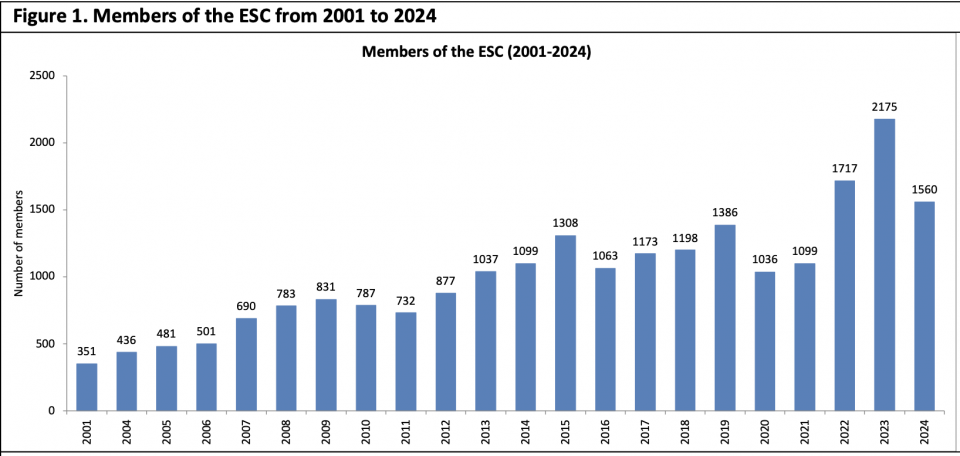
A notable development in 2024 was the increase in the proportion of student members, which rose to 25.6% (399 out of 1,560 members), compared to 24% in 2023. This increase in student representation suggests continued strong engagement from emerging criminologists and reflects the ESC's ongoing commitment to nurturing the next generation of scholars in the field.
The membership pattern observed between 2023 and 2024 illustrates a characteristic phenomenon in academic societies where conference location and timing can significantly influence membership numbers. The exceptional appeal of Florence in 2023, combined with the pent-up demand for international academic interaction following the pandemic, created optimal conditions for membership growth. The subsequent adjustment in 2024 reflects a return to more sustainable membership levels while maintaining the society's expanded reach and influence. This cyclical pattern continues to manifest itself, as evidenced by the strong early registration figures for the 25th Annual Conference in Athens, Greece, which at the time of finalising this report (early July 2025) had already attracted more than 2,000 participants, suggesting renewed momentum for the Society.
Geographical distribution of ESC members in 2024
The year 2024 saw continued diversity in the geographical distribution of ESC members, with representation from 58 countries — 60 if figures for the United Kingdom are broken down by nations — across the five inhabited continents. While total membership decreased to 1,560 members from the 2023 peak, the international character of the Society remained strong, demonstrating the ESC's enduring global appeal and its role as a truly international forum for criminological discourse.
European countries continued to form the core of the Society, accounting for approximately 84% of the total membership. However, the presence of members from non-European countries (16% or 244 members) underscores the ESC's expanding influence beyond European borders and its success in fostering global criminological networks.
The United Kingdom maintained its position as the country with the highest number of members, contributing 340 individuals, or 22% of the total membership. This was followed by the Netherlands with 129 members (8.3%) and the United States of America with 127 members (8.1%), highlighting the continued strength of transatlantic ties within the criminological community.
Germany, Belgium, and Spain rounded out the top six countries, each contributing significant numbers of members and collectively representing about 21% of the total membership. This strong representation from major European countries reflects both the development of Criminology in these nations and their continued investment in criminological research and education.
Italy's representation with 85 members (5.4%) seems to reflect the lasting impact of the highly successful Florence 2023 conference, while Romania's strong showing with 44 members (2.8%) likely reflects both the hosting of Eurocrim 2024 in Bucharest and the growing criminological community in Eastern Europe.
The Nordic countries collectively maintained their traditional strong presence within the ESC, with Norway leading at 41 members, followed by Sweden (28), Denmark (21), Finland (16), and Iceland (10). This represents approximately 7.4% of total membership and reflects the continued importance of Nordic criminological research traditions.
Central and Eastern European countries showed solid representation, with Poland (42 members), Slovenia (20), Hungary (12), Croatia (11), and Czechia (11) revealing the continued growth and integration of criminological communities in this region.
Beyond Europe, the global reach of the ESC was evident in strong participation from Canada (24 members), Australia (23), and Israel (25), as well as representation from Asia, including Japan (10), China (7), and South Korea (2). The presence of members from Latin American countries such as Brazil (5), Mexico (5), Chile (3), and several others highlights the Society's growing influence in emerging criminological scenes.
The participation of members from countries with developing criminological communities, including several African, Asian, and Latin American nations, highlights the ESC's role in fostering global criminological development and cross-cultural academic exchange.
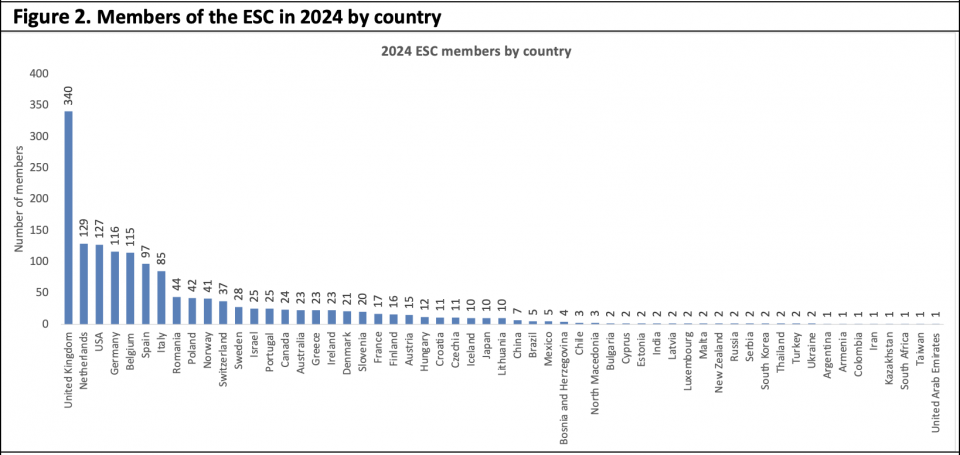
In sum, despite the overall decrease in membership from 2023, the geographical distribution of ESC members in 2024 continued to reflect a vibrant and diverse international community. The Society's ability to maintain broad international representation while experiencing natural fluctuations in total membership corroborates its resilience and continued relevance in the global criminological landscape.
Eurocrim 2024 in Bucharest: The 24th Annual Meeting of the ESC
Under the title “Criminology Goes East”, the 24th Annual Meeting of the ESC, Eurocrim 2024, held in Bucharest, Romania, from 11 to 14 September 2024, successfully maintained the society's tradition of high-quality international conferences. The event attracted 1,577 participants, representing a solid turnout that, while lower than the record-breaking 2,484 attendees in Florence 2023, demonstrated continued strong engagement within the criminological community.
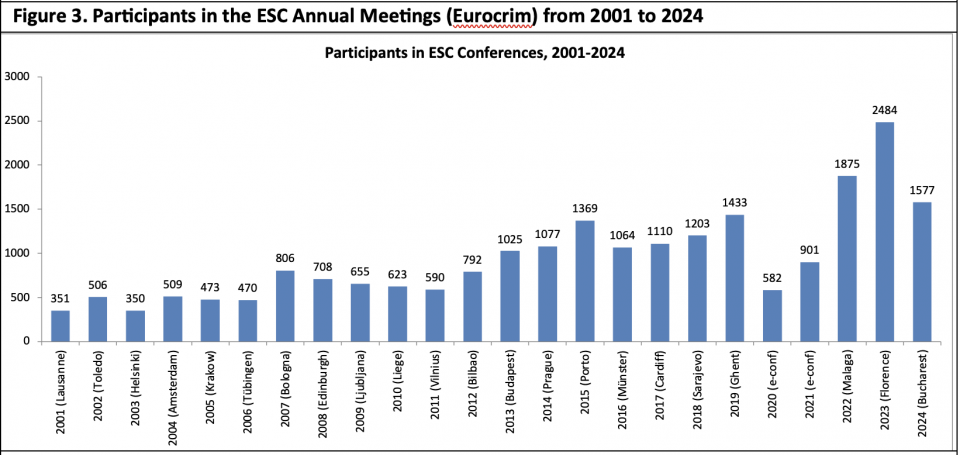
The attendance at Eurocrim 2024 reflects several important factors. Following the exceptional peak in Florence, a moderation in conference attendance was anticipated, yet the Bucharest conference still drew significantly more participants than many pre-2022 conferences. The choice of Bucharest as the venue also provided an important opportunity to strengthen criminological networks in Eastern Europe and to showcase the growing research capacity in this region.
The conference's success can be measured not only in attendance figures but also in its contribution to fostering international collaboration and knowledge exchange. Bucharest provided an excellent setting for both established and emerging criminologists to present their research, engage in scholarly debates, and build professional networks that span geographical and institutional boundaries.
The relationship between conference attendance and membership remains evident, with both metrics showing parallel trends. While both figures declined from their 2023 peaks, they maintained levels that demonstrate the ESC's continued vitality and appeal within the international criminological community. This enduring appeal is further confirmed by the strong early registration for the upcoming 25th Annual Conference in Athens, Greece, which by early July 2025 had already exceeded 2,000 registered participants, indicating the Society's continued capacity to attract and engage the global criminological community.
ESC Awards
In 2024, the ESC continued its tradition of recognizing excellence in Criminology by presenting five awards: The ESC European Criminology Award, the ESC Young Criminologist Award, the European Journal of Criminology (EJC) Best Article of the Year Award, the ESC Early Career Award, and the Book Award. The awardees received their plaques and diplomas during the opening ceremony of the 2024 Eurocrim conference in Bucharest, Romania.
2024 European Criminology Award
The 2024 ESC European Criminology Award, recognising a lifetime contribution to European Criminology, was presented to Per-Olof Wikström. The award committee, composed of former ESC presidents Aleksandras Dobryninas (chair, Vilnius University), Catrien Bijleveld (NSCR and Vrije Universiteit Amsterdam, Netherlands), and Klaus Boers (University of Muenster, Germany), highlighted Professor Wikström's significant contributions to the field. They particularly noted his integration of developmental and environmental Criminology in Situational Action Theory (SAT), the comprehensive PADS+ study as one of the most successful and largest longitudinal investigations of crime in the UK, his innovative methods for understanding how environmental features and personal characteristics impact involvement in crime, the influence of his research on UK crime policies and international crime prevention practices, and his exceptional international reputation, evidenced by numerous honours including the Stockholm Prize in Criminology and fellowships from prestigious academic societies.
2024 ESC Young Criminologist Award
Laura Kennedy received the 2024 ESC Young Criminologist Award for her article “Prioritise Propensity: A multimethod analysis of peer influence and school-based aggression” published in Deviant Behavior. The award committee, consisting of Klaus Boers (chair, University of Muenster, Germany), Olga Petintseva (Vrije Universiteit Brussel, Belgium), and Rita Faria (University of Porto), praised Kennedy's work for its theory-guided and methodologically innovative empirical investigation of the interaction between personal propensity and environmental peer settings in aggressive behaviour, significant findings on the relevance of aggressive peers in different propensity contexts, and important policy implications, suggesting that strengthening prosocial propensity may be more fundamental for preventing aggression than reducing exposure to aggressive peers.
EJC Best Article of the Year 2023 Award
Florian Kaiser, Björn Huss, and Marcus Schaerff were honoured with the ESC European Journal of Criminology Best 2023 Article Award for their paper “Differential updating and morality: Is the way offenders learn from police detection associated with their personal morals?” The award committee, comprising ESC President Josep Maria Tamarit-Sumalla, Alberto Chrysoulakis and Leonidas Cheliotis – recipients of the previous year award – and EJC Editor-in-Chief Kyle Treiber, highlighted the paper's strong, theory-driven empirical contribution to the study of differential deterrent effects, its sophisticated analysis of data from the CRIMOC panel study in Germany, the impressive theory-guided framing of research questions and design, and the paper's broad applications and important implications for crime policy and prevention.
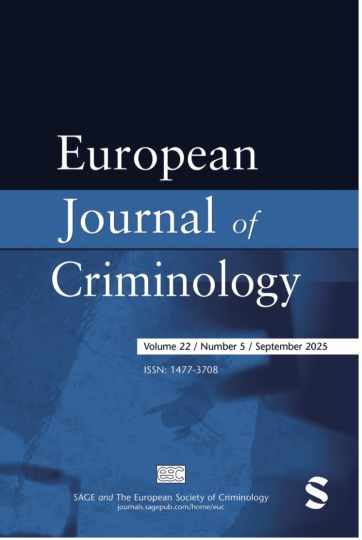
2024 ESC Early Career Award
The 2024 ESC Early Career Award, recognising outstanding scientific achievement by an early career European criminologist, was presented to Gian Maria Campedelli. The award committee, consisting of Michele Burman (Chair, University of Glasgow), Josep Maria Tamarit-Sumalla (Universitat Oberta de Catalunya), and Anna Di Ronco (University of Essex), commended Dr. Campedelli for his cutting-edge work at the interface between computational studies and Criminology, broad expertise spanning quantitative Criminology, machine learning, homicide, and crime prevention, developing new methodologies to explore contemporary crime problems, an impressive publication record in high-profile criminological and scientific journals, and his single-authored monograph on machine learning and AI in crime research, addressing ethical consequences of such methodologies.
2024 ESC Book Award
Evelyn Svingen received the 2024 ESC Book Award for her work “Evolutionary Criminology and Cooperation: Retribution, Reciprocity and Crime”, published by Palgrave Macmillan. The award committee, composed of Michele Burman (Chair, University of Glasgow), Ineke Haen-Marshall (Northeastern University), and Letizia Paoli (University of Leuven), praised the book for its bold attempt to understand the contribution of evolutionary theory to the study of crime, presenting philosophical and methodological arguments for the indispensability of evolutionary frameworks in Criminology, developing the Retribution and Reciprocity Model (RRM) as a tool for integrating with other theories, its novel methodology using a game theory approach adapted from behavioural economics, and providing a coherent and scholarly overview of the rationale, justification, methodology, and evidence for using the framework of retribution and reciprocity in understanding crime.
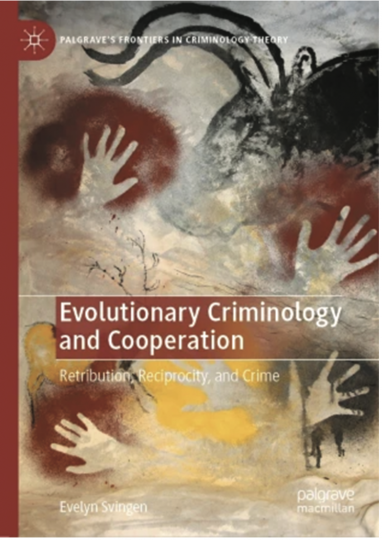
All in all, these awards reflect the ESC’s commitment to recognizing and promoting excellence in criminological research and scholarship across Europe and beyond.
Briefs
Elections
In 2024, Michele Burman assumed the role of President-Elect of the ESC, and Marieke Kluin from Leiden University, the Netherlands, was elected as an At-large ESC Executive Board member.
ESC Summer School
The first ESC Summer School took place in Lausanne from 19 to 23 September 2024, coordinated by Fernando Miró-Llinares with the support of Lorena Molnar, and with administrative and partial financial support from the University of Lausanne through its International Relations Office. This landmark initiative represents a significant milestone in the Society’s commitment to advancing criminological education. The European Summer School on Criminology was designed to enhance the education of emerging scholars and to lay a strong foundation for the next generation of European criminologists and their professional networks.
The Summer School's primary goal is to strengthen the scientific community and prepare for future developments in the field. It serves as a forward-thinking initiative that connects experienced and emerging experts, fostering mentorship relationships and paving the way for a larger, more interconnected community in the years ahead. The program featured speakers who were winners of previous ESC awards, ensuring the highest quality of instruction and mentorship for participants.
The overwhelming response to this inaugural program demonstrated the strong demand for such educational opportunities within the criminological community. All twenty available places were filled, with applications reaching double the number of places available, highlighting the enthusiasm among emerging scholars for advanced training and networking opportunities. A participant's perspective from Daniela-Irina Stadniciuc was featured in issue 3/2024 of the ESC Newsletter, providing valuable insights into the impact and value of this new educational initiative.
European Criminology Oral History Project (ECOH)
Under the supervision of José A. Brandariz with the support of Ignacio González-Sánchez, six interviews were conducted during Eurocrim 2024 in Bucharest. The interviews included Hans-Jörg Albrecht interviewed by Anna-Maria Getoš Kalac, Manuel Eisner interviewed by Marcelo Aebi, Janne Kivivuori interviewed by Nora Markwalder, Ian O'Donnell interviewed by Deirdre Healy, Sveinung Sandberg interviewed by Thomas Ugelvik, and Marcelo Aebi interviewed by Lorena Molnar.
These interviews are available on the ESC YouTube Channel and contribute to preserving the rich history of European Criminology for future generations.
Keep in touch
To stay up to date with the latest ESC news, please visit:

